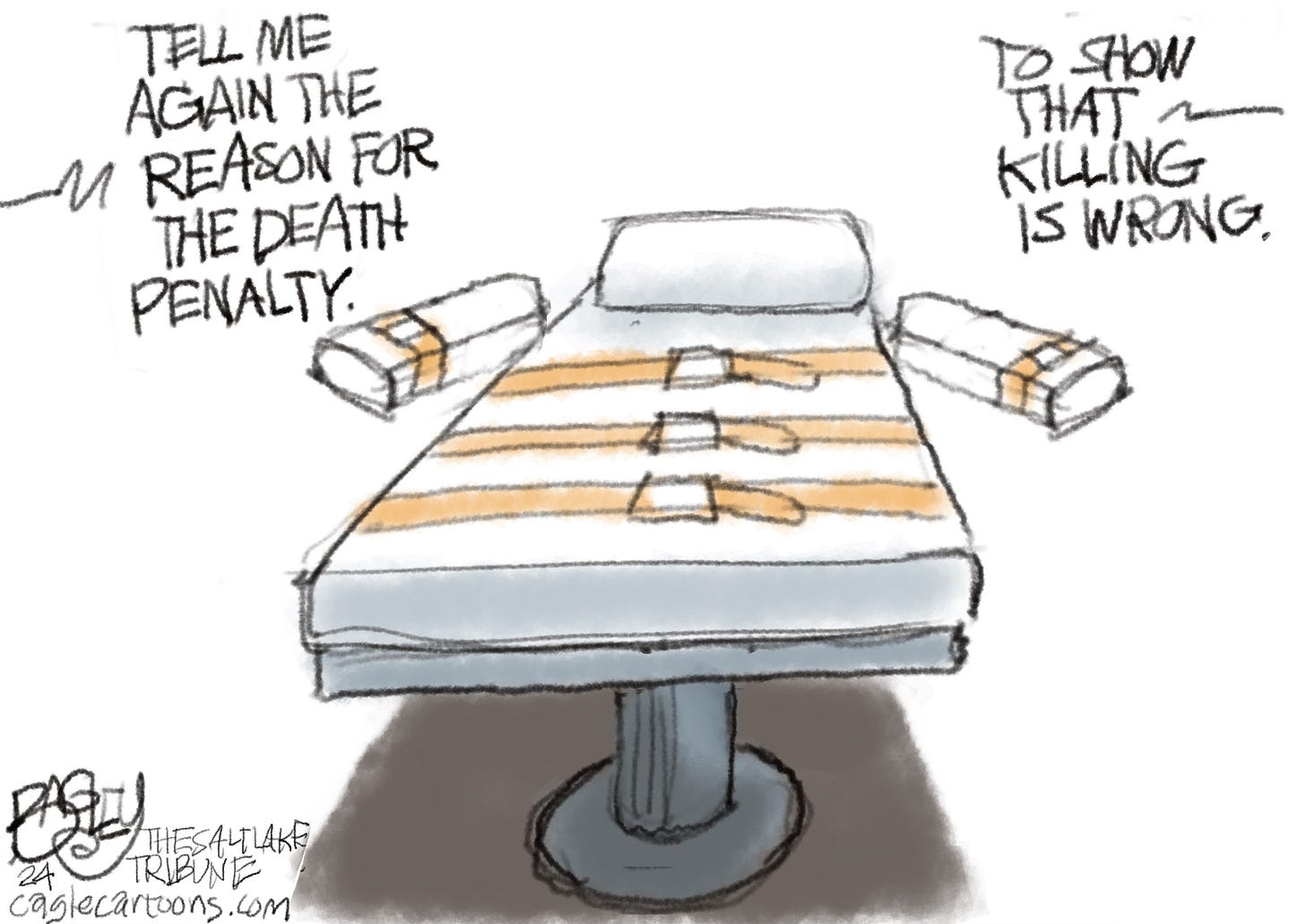Oklahoma carried out its fourth execution of the year last week and Sooners collectively … what? Yawned? Went holiday shopping? Made Christmas cookies?
The lethal injection came on Kevin Ray Underwood’s 45th and final birthday, punishment for a 2006 cannibalistic fantasy in which he bludgeoned, sexually assaulted and nearly decapitated 10-year-old Jamie Rose Bolin.
To say Underwood was a less than sympathetic figure would be an understatement. But that isn’t the real issue as a new year and new legislative session fast approach.
Oklahomans instead should ask themselves these questions:
Why do we still resort to state-sanctioned killing?
Why do we carry out executions at one of the nation’s highest rates – third most this year, tied with Missouri and trailing only Alabama [6] and much-larger Texas [5].
What is it about us that makes death a permissible legal punishment when 23 other states reject it – and of the 27 that allow it, only nine executed convicts this year? Are Okies somehow more prone to murder and mayhem than folks in other states?
Why is revenge an acceptable punishment in a civilized, 21st century society?
Why take a chance on executing the innocent? Eleven Oklahoma death row inmates have been exonerated over the last four decades, including Glynn Ray Simmons, the nation’s longest serving inmate who spent 50 years in prison before being cleared of wrongdoing.
Why risk ruining lives and costing the taxpayers a fortune? In Simmons’ case, he lost a half-century of his life and Edmond taxpayers were stuck with a $7.15 million settlement for his wrongful incarceration.
Why spend far more to prosecute, fight appeals, incarcerate and execute someone than it costs to impose life without parole?
The only plausible answer to why Oklahoma clings to the death penalty is revenge – which is hardly good public policy. Myriad independent, clear-eyed studies have found little to suggest the death penalty is a deterrent.
Moreover, research points to widespread evidence that race and socioeconomic status often determine who gets a death sentence and whose life gets spared.
Rather than pour tax dollars into a punitive system that doesn’t deter murder, what if Oklahoma instead made mental health care and treatment a priority? What if someone like Underwood could get access to life-changing care?
There still would be people who refuse the help they need, of course. But it makes sense to attack the problem at its source – by helping troubled individuals avoid potentially violent impulses.
Appearing via teleconference at a recent Oklahoma Pardon and Parole Board clemency hearing, Underwood did not deny murdering Jamie Rose Bolin.
“I would like to apologize to the victim's family, to my own family and to everyone in that room today that had to hear the horrible details of what I did,” he said. “I can't believe I did those things. The person I was in the weeks leading up to that event is not who I am now.”
Whether or not Underwood’s words were sincere – something many Oklahomans would likely doubt – doesn’t really matter. What’s not debatable is this: the death penalty is costly and doesn’t deter murder.
That is a fact with which the Oklahoma Legislature eventually will be forced to come to grips. Though state coffers currently overflow, they won’t always be, given the boom-bust nature of Oklahoma’s economy.
Why wait until the state faces its next economic calamity to tackle the ever-increasing costs associated with carrying out death sentences?
The 2025 session affords a golden opportunity to reconsider capital punishment through a public policy – not a political – prism. And to begin taking the steps necessary to abolish an ineffective relic of criminal justice’s past.






Writing right on...though when I saw the headline, I thought it was going to be about the next Trump term.
Thank you, Arnold.
Executing prisoners isn't about being "on the side of the victims" as it is often framed. What a person "deserves" as punishment is less pertinent than the kind of society we each deserve to be a part of. Just as torturing prisoners--even guilty ones who arguably "deserve it" for what they did--crosses the line into barbarity, so it is with putting prisoners to death. Fundamental human rights.